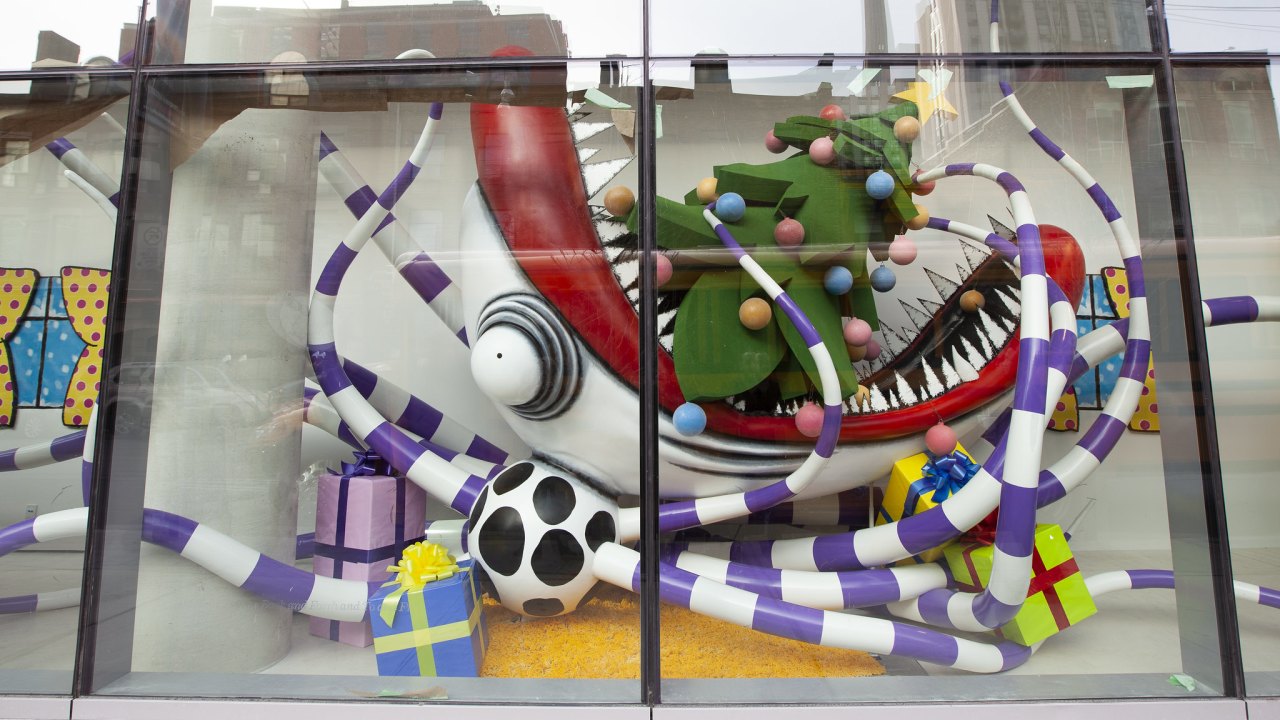Lost Vegas: Tim Burton at The Neon Museum
LAS VEGAS – For the first time in nearly a decade, renowned American film director, producer, artist, writer and animator Tim Burton will stage an exhibition of his original fine art in the United States. Installed at the Neon Museum in Las Vegas, “Tim Burton @ the Neon Museum” will be staged at multiple locations: the museum’s outdoor Boneyard exhibition space, in its North Gallery and at the City of Las Vegas’ Boneyard Park across from the museum’s visitor’s center. The exhibition will comprise a combination of new work as well as previously exhibited pieces and will be on view from October 15, 2019, through February 15, 2020.
Created to take advantage of the museum’s unique open-air exhibition spaces, the large-scale installation works will be integrated with the museum’s collection. Burton intends for the exhibition to serve as a retrospective of his own creative history, as well as a celebration of his affection for the Neon Museum. Conceived as a collaboration with the museum, it will be genuinely site-specific and unlike any other exhibition Burton has ever staged.
“To say we’re flattered that Mr. Burton has chosen our museum for this exhibition would be an understatement,” said Rob McCoy, president and chief executive officer, Neon Museum. “But when you think about it, Tim is one of the few artists who can match the great imagination of Las Vegas.”
Credited with bringing the first worldwide attention to the Neon Museum’s collection in his film Mars Attacks! (1996), Burton’s exhibitions have drawn millions of patrons around the world in cities such as Melbourne, Los Angeles, Paris, Prague, Tokyo, São Paulo and Mexico City. His exhibition at MoMA in New York City drew more than 800,000 visitors, making it the third most attended exhibition ever.
ABOUT TIM BURTON
Tim Burton, director and artist, is widely regarded as one of cinema’s most imaginative and visual filmmakers. He has achieved both critical and financial success in the live-action and animation genres. Burton’s accomplishments in filmmaking are a consequence of his artistic eye. Long before becoming a director, Burton expressed himself through drawing and painting, which also became an integral part of his creative process.
In 2015, Burton released The Napkin Art of Tim Burton, a book of sketches, doodled on napkins he had collected from his travels. It is a look in the mind of a man who is always on the road, and ever observant of the strange world around him. The book is a mini-companion to his 2009 release, The Art of Tim Burton, a 430-page volume comprising more than 40 years of his personal and project artwork. In November of that year, the Museum of Modern Art opened an extensive exhibition of his work in New York, which went on to tour in Melbourne, Toronto, Los Angeles, Paris, and Seoul. A new version of his exhibition, The World of Tim Burton, has been presented in Prague, Tokyo, Osaka, Brühl, São Paulo, Shanghai, Hong Kong, Mexico City, Genk, and continues to tour internationally. In 1997, he published the beloved illustrated series of poetry called The Melancholy Death of Oyster Boy & Other Stories.
Burton’s most recent directorial work, Miss Peregrine’s Home for Peculiar Children (2016), is based on the visually arresting novel of the same name, which winds its story around a collection of vintage photographs. Its characters and imagery are brought to life in Burton’s unique adaptation.
Burton’s previous project, Big Eyes (2014), for which Amy Adams received a Golden Globe, is a confluence of his two passions—film and art.
Perhaps his greatest industry achievement is helping to reinvigorate the stop-motion industry, starting with his 1993 creation and cult classic Tim Burton’s The Nightmare Before Christmas; and followed by the 2005 Tim Burton’s Corpse Bride and 2012’s Frankenweenie, both Academy Award and BAFTA–nominated films. He has also produced James and the Giant Peach and 9.
Other film milestones include Alice in Wonderland (2010), which won two Academy Awards, and earned more than a billion dollars at the worldwide box office. Burton has won a National Board of Review award for his directing work on 2007’s Sweeney Todd: The Demon Barber of Fleet Street, which also won the Golden Globe for Best Film–Musical or Comedy, and Best Actor–Musical or Comedy for Johnny Depp. He earlier received a BAFTA nomination for Best Director for the 2003 fantasy drama Big Fish. His most critically acclaimed film, the 1994 Ed Wood, won two Oscars, a Golden Globe, and two BAFTA nominations.
He has a dedicated following, notably for classic features such as his 1985 directorial debut and unexpected comedic hit, Pee-wee’s Big Adventure; the 1988 wildly inventive Beetlejuice; the action blockbuster Batman (1989); and its 1992 follow-up Batman Returns.
Arguably his most beloved film is the 1990 romantic fantasy Edward Scissorhands—directed, co-written and produced by Burton. The film also marked the start of his successful cinematic partnership with Johnny Depp, who delivered a poignant performance in the title role.
Other directorial projects include Dark Shadows (2012), Charlie and the Chocolate Factory (2005), Planet of the Apes (2001), Sleepy Hollow (1999), and Mars Attacks! (1996).
He has produced several other films including Alice Through the Looking Glass, Abraham Lincoln: Vampire Hunter, Cabin Boy, Batman Forever, and directed two music videos for The Killers.
Burton grew up in Burbank, California and attended the California Institute of the Arts (CalArts), where he studied character animation, before joining the animation department at Disney. While at the studio, he directed the 1982 stop-motion animated short film Vincent, narrated by Vincent Price. He also directed the 1983 kung fu–inspired short film adaptation of Hansel and Gretel, and the 1984 live-action short film Frankenweenie.
Burton’s next film, Dumbo, a live-action reimagining of the Disney animation classic opens in theaters on March 29, 2019.
More info: The Neon Museum








